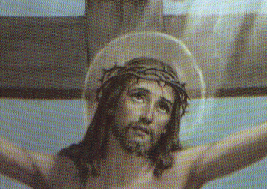
Jesus and Mammon
Jesus's attitude in front of the money is
undoubtedly related to the intention with which this one is seen by the man.
"Mammon" is an aramaic word that means "wealth". The word "Mammona"
is used by Jesus to point out the wealth's personification badly earned.
The Rabbi of Nazaret certainly expresses, in his teachings and in
his "locution" a severe judgment criticizing the seductive strength of the
wealth declaring it a risk in the respects of the choice for the salvation: "How
much those people who have wealths will hardly enter the Kingdom of God" (Mk
10,23).
Even in the Luke's Gospel we find even more a
disruptive sentence of Jesus:
"But woe to you that are rich, for you have received your consolation. Woe to you that are full now, for you shall hunger. Woe to you that laugh now, for you shall mourn and weep (Lk. 6,24-25).
Yet this Jesus that calls with contempt the wealth with the epithet of "mammon", he doesn't avoid, during his public life, the rich ones, neither he strongly appears rebellious in their comparisons. he appears in his behavior a different attitude: negative judgment of the wealth, up to call it "iniquitous wealth" (Lc 16,9), that however it is associated to a dialogue with the rich ones and the well-off ones.
A relationship that many times he tries to establish, also in the case in which some of these rich
men don't cross their own road with him. In the heart of Jesus there is the
supreme demand to save all: rich and poor, powerful persons and weak. Even
if the weak and the poor men have a privileged place in his heart.
"He entered Jericho and was passing through. And there was a man named Zacchaeus; he was a chief tax collector, and rich. And he sought to see who Jesus was, but could not, on account of the crowd, because he was small of stature. So he ran on ahead an climbed up on a sycomore three to see him, for he was to pass that way. And when Jesus came to the place, he looked up and said to him, "Zacchaeus, make haste and come down"; for I must stay at you house today". So he made haste and came down, and receivede him joyfully. And when they saw it they all murmured: "He has gone in to be the guest of a man who is a sinner". And Zacchaeus stood and said to the Lord: "Behold, Lord, the halp of my goods I give to the poor; and if I have defrauded any one of anything, I restore it fourfold". And Jesus said to him: "Today salvation has come to this house, since he also is a son of Abraham. For the Son of man came to seed and to save the lost" (Lk 19, 1-10).
Little time before, Luke had written a meeting among Jesus and the
rich youth
that really because attached to hisr wealths he had refused to follow
Jesus (Lk 18, 18-23), and the hard words of comment by the Teacher << And
easier for a camel [or cable? as it comments the New version of the Bible,
n.d.r.] to pass for the eye of a needle that for a rich to enter the Kingdom of
Lord"(Lc 18,25). All this contributed to create a difficult case for
Zaccheo and for Jesus which, obviously, after those words he could not
appear too much indulgent toward a rich. Yet the << difficult >>, rather happens << the
impossible one for the men >> (Cfr 8,27). Christ doesn't exclude
anybody from his kingdom that is offered to everybody, rich and poor, to
condition of << to change >> their own heart, that is of << to convert him >>
"(Settimio Cipriani, Fed by the word, year C, and. Paoline, p. 373).
"Jesus doesn't condemn the wealth for itself same but because it has the
tendency to become an idol, that is adored and served to the place of God (Mt
6,24), it absorbs physical and spiritual energies, it makes deaf
to the call of the Kingdom and the necessities of the brothers (Cfr
Luca 16,19-31). he Asks above all the renouncement to the terrestrial good as
action of love toward the needy brothers. For Jesus the wealth that doesn't come
in some way put to the service of the other ones is << iniquitous >> (Luca
16,9). Sign of sin. In short the discourse on the wealth allows Jesus to
underline the reflexes of social goodness required by the conversion to the
Gospel to. (Cfr. Mauro LÓconi, Also the rich one can be saved, in History of Jesus,
and. Rizzoli, vol 4, pag. 1240).
TO THE DISCOVERY OF JESUS OF NAZARETH